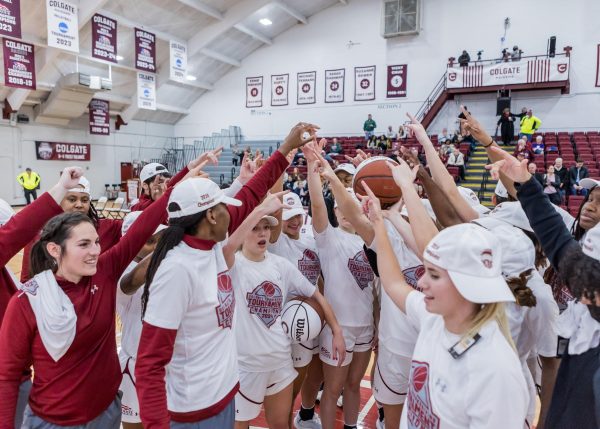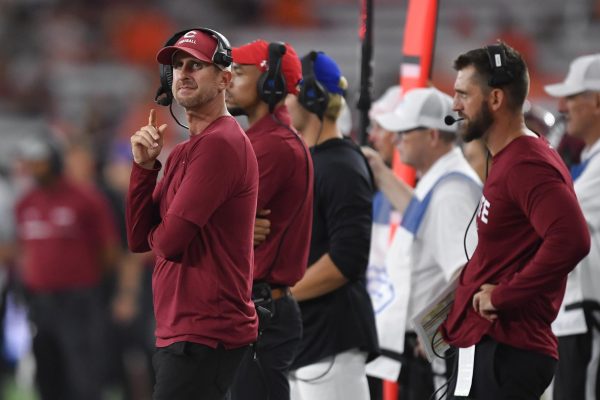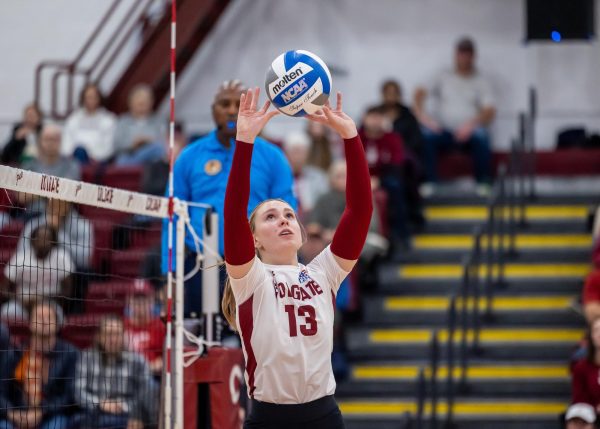ESPN Writer Sits Down with the Maroon-News
In 1995, 24-year old John Hollinger started a blog-like website called Alleyoop.com, touting the site as “The Basketball Page for Thinking Fans.” What started as a hobby for the UVA graduate quickly became much more. His unique experimentation with quantitative analysis in basketball grabbed the attention of national media and helped land him editor positions at The Oregonian and Sports Illustrated. Now, Hollinger is one of the head NBA writers for ESPN.com and is considered a pioneer in sports analytics. He is best known for developing Player Efficiency Rating (PER), now a widely used statistical rating of an NBA player’s per-minute productivity.
This November, Hollinger came to Colgate to talk with a section of Professor Ken Segall’s Scientific Perspectives class, Sports and the Scientific Method. Later that night, one of the nation’s most influential NBA writers joined Segall’s class to watch the Boston Celtics take on the Oklahoma City Thunder. I sat down with John Hollinger to talk about his career in journalism, Bill James, the Cy Young award and the Miami Heat.
Raymond: Tell us about your career as a sports journalist.
Hollinger: In 1995, when the Internet was still in its infancy, I created a website called alleyoop.com. I did my basketball ratings and wrote columns on basketball that opened the door to everything else. From there, I became the Sports Editor for the Oregonian‘s website. Three years after that, I got a contract to write a book called Pro Basketball Forecast in which I would explain my formulas in more detail and write about individual teams. From that I was hired at Sports Illustrated to be an NBA editor for their website.
R: How different was Sports Illustrated from a local newspaper like The Oregonian?
H: It was completely different because at the Oregonian, there was the Blazers, but besides that everything was local so I spent a lot of time covering high school sports. I was also an editor more than a writer (at both the Oregonian and SI). I would write occasionally, but other than writing the book, I was working mostly as an editor. It was the jump to ESPN when I got the opportunity to write full-time and focus on what I’m doing now.
R: What separated alleyoop.com from other sports websites that made you garner national attention?
H: First of all, I was 10 years earlier than everybody else. More than that, it was a niche that had not been served. No one had ever really looked at doing analytics beyond baseball so I think that’s where I stepped in. In truth, Dean Olvier was doing the same thing at about the same time (now the Director of Quantitative Analysis for the Denver Nuggets) so I think it was just that moment in time was there for us to seize. We were just fortunate to be in our early 20s when that window opened. We made sure to jump through it.
R: You have been called the ‘Bill James of Basketball.’ What do you think of that characterization?
H: There is one Bill James and only one. It’s flattering but I would not even begin to compare myself. He created an entire industry out of nothing and he’s the reason that all of us are employed.
R: When Felix Hernandez won the Cy Young award, your colleague Bill Simmons declared it was ‘Stat Dork Appreciation Day.’ Do you agree with his assessment?
H: It was a seminal moment for anyone who does this because it was the first time that the mainstream was convinced by the arguments of the Sabermetric people. I think that’s a real turning point.
It’s been a hard-fought battle. Just a couple weeks ago, you have Derek Jeter winning a Gold Glove award which is ridiculous. So even in baseball where this has gone on the longest, it’s still been a real battle against conventional wisdom. Bill James’s books came out in the early 80s, and 30 years later, finally we get to the point where we have real acknowledgment that we should be looking past these traditional statistics we used to be looking at.
I was amazed Felix [Hernandez] actually won it though. I wasn’t sure the day was going to come when that was possible.
R: Do you think statistical analysis will continue to become main stream in baseball and other sports?
H: I think so. In baseball, its so proven that you have to understand this to really know what your talking about. It’s driven by fans because they have access to all this information now so any writer who tries to defend the former status quo ends up getting called out by his own readers. It’s become an increasingly untenable position.
We’re not anywhere near that point in any other sport, but baseball also had a two decade lead on us. I do think the appreciation of those more complicated stats is going to increase.
R: There are a lot of traditionalists who argue that heavy statistical analysis de-romanticizes sports. What do you say to those critics?
H: I don’t tell you how to watch the game. If that’s how you want to consume the game then go for it but it’s a little like saying ‘You’re de-romanticizing that the earth is square.’ At some point, you want to know more. Being here on a college campus, that’s what it should be about – people come here to learn more, ask questions, research and find out new information. It seems like a Luddite reflex to not even want access to that additional information. Why wouldn’t you want to know?
R: Do you have any advice for aspiring journalists?
H: The biggest thing is to start doing things. The more you write, the more experience you have, the more clips you can show people, the more legitimate you seem to any future employer, even on your own website or blog, just taking those steps to establish yourself makes a difference. It never happens as fast as people want but it does happen. I’ve seen it with me and seen it with other people too. The more you write, the better you get, the faster you get. You have to be able to convey a story to people in a concise and entertaining way, and the only way to do it is to practice.
R: Let’s shift to some sports questions. Do you think a salary-cap system like in the NBA creates or hinders parity?
H: I think a salary cap would be more helpful for baseball than for basketball because, in the NBA, if you have two good players you will have a good team. This year’s Miami Heat are a perfect example. They have three good players and nobody else who is even league average but they’re going to end up winning a ton of games. That model does not work in baseball. You need to spend the money in a more distributed way. So I think a salary-cap system would have a greater impact in baseball than it ever has in basketball.
R: What do you make of the early struggles of the Miami Heat?
H: I picked them to win the title before the season. I don’t know if they actually will but they’re going to be among the best teams in the league. If the new collective bargaining agreement in basketball allows them to add one or two half-way decent players to what they have, they’re going to win multiple championships because the three players at the core are that good.
R: Who else do you think will be in contention for the NBA championship?
H: You have to look at the Los Angeles Lakers. You cannot dismiss them because they’ve won the last two championships and, especially with how well they’ve played early in the season. You certainly have to look at the Boston Celtics. They are an older team but one that plays really good defense and matches up well against Miami. And everyone dismisses the Orlando Magic at their own peril, especially when you talk about a matchup with Miami, I think Dwight Howard is a player Miami will have a tough time stopping. Those four teams is where it starts and then you get into the second tier of San Antonio and New Orleans.
R: What is your favorite part of your job?
H: Going to the arena and not knowing what’s going to happen next. Every time you go to watch a game, there is the excitement that you might see something that you’ve never seen before. I don’t think that’s the case with every job. When that ball goes up at tip off, there is an excitement level that is difficult to find anywhere else.






